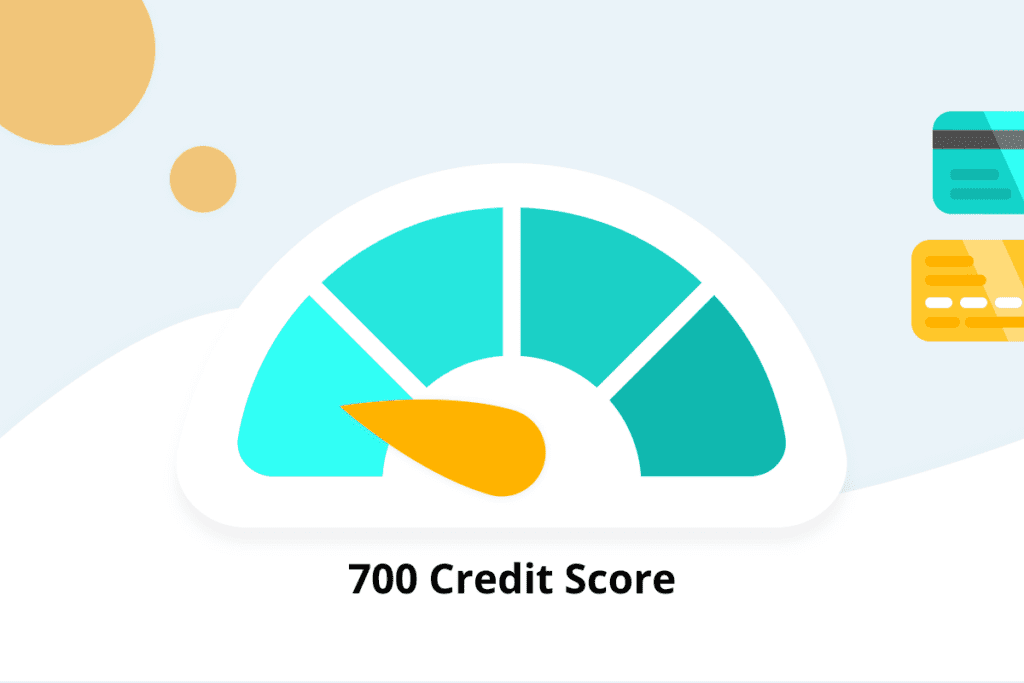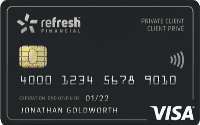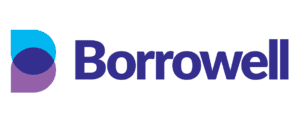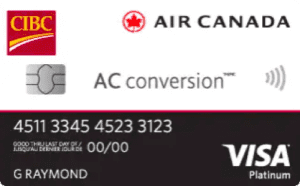
A 700 credit score starts to unlock better terms and lower rates. Credit involves requesting a specific amount of money from a financial institution, company, or individual, with the promise to pay it back within a specific period of time. Borrowing funds from a creditor requires some trust, and good credit , like a 700 credit score, can present wonderful opportunities for you.
How would you feel knowing you qualify for better financial loans and mortgages because of your credit score? Excited, right?
Unfortunately, most of us don't think about our credit score until we are about to apply for a loan or rent an apartment. However, your create score relates to your financial health in many ways, so check it regularly. Here's what a 700 credit score can do for you for in Canada.
- How to access your credit score
- So what is your credit score?
- What you can get approved for with a 700 credit score
- Qualifying for a mortgage and buying a home is much easier
- How to get and keep your 700 credit score
- Are there any accounts that are past due or in collections?
- What is your Credit Utilization Ratio?
- How long have you had these accounts?
- Which credit products do you have?
- Is there any inaccurate information?
- A 700 credit score is just the beginning
- What you can't get approved for with a 700 credit score
- Recap of the golden rules to build your credit score
- Pay down your debt
- Don't close accounts
- Settle bad debts ASAP
- Monitor your credit
- Use credit cards strategically
- What did you learn?
- Frequently asked questions
- Conclusion
How to access your credit score
You can check your credit score with both TransUnion and Equifax. These are two credit reporting agencies in Canada. The credit score you get from one credit reporting agency may differ from the score you get from the other.
Each reporting agency uses its own proprietary scoring model. While generally speaking, they use the same approach, they each rank certain variables differently which impacts your final score differently between Equifax and TransUnion.
You must contact the agency via their official dispute process if there are any discrepancies in your credit report. The law requires that mistakes be removed from your credit report. Fixing errors on your Equifax report and errors on your TransUnion report will positively impact your score.
So what is your credit score?
Credit scores range from 300-900; if your score is 700, that means you have “good” credit, according to the Equifax matrix. The average credit score in Canada is around 672, so if you have a 700 credit score, you are doing better than many Canadians.
What you can get approved for with a 700 credit score
First and foremost is the boost in self-esteem; there is no denying how great it feels knowing you will be approved for just about any type of credit product you need. Then, your good credit score opens the door to many opportunities you didn't think possible. Remember, a credit score tells people you are trustworthy in paying back debts.
- Do you want to buy a new cell phone but don't want to pay immediately? A 700 credit score qualifies you for special offers on tech like the latest Apple or Android smartphone.
- Are you thinking about applying for a high-level managerial job? One of the criteria they will review is your credit score. Having a 700 credit score shows that you're responsible and have been intentional about your finances.
- The cost of buying and owning a car will be considerably lower. The pandemic has made car loan providers more risk-averse than usual. With your credit score, you could get a zero 0% car loan on select models or even low-interest rates on other cars. You are classified as a prime client.
Achieving a 700 credit score does not happen by chance. It takes years to reach that level by managing your credit responsibly.
Qualifying for a mortgage and buying a home is much easier
If you are self-employed, your 700 credit score qualifies you for mortgage default insurance, like CMHC. Mortgage default insurance can help you qualify for a mortgage when your income is difficult to verify, and it helps people buy a home without a 20% downpayment.
If you don't want to buy a new house, your good credit score can help you rent an apartment. Although, the rental marketplace in Canada is quite competitive. Landlords can do credit checks on potential renters, and having a good credit score can give you an edge over the other potential renters.
How to get and keep your 700 credit score
Credit scores are always in flux; this is excellent news if your score is below 700. Next, we'll show you how to boost your credit score. One of the easiest things to do is to request free copies of your credit report from TransUnion and Equifax.
Earlier, we suggested you check out your credit score; this score is calculated based on the information in the report. After that, you will have to do some analysis of your own.
Are there any accounts that are past due or in collections?
Your credit score will suffer if you have accounts that are past due or have been sent to third-party collection agencies. These documents are retained for at least seven years.
We cannot emphasize enough how crucial it is to have your accounts current so that you pay off the collections and bring the accounts current. If you want help deciding the best way to pay off your debts, you can use our debt calculator or credit card repayment calculator to show you some options.
What is your Credit Utilization Ratio?
This shows how much debt you currently owe on credit cards and lines of credit vs. their credit limits. Your credit utilization rate would be 90% if your credit card limit was $10,000 and you owed a balance of $9,000.
Your credit score will be negatively impacted by carrying that much debt, so work to reduce your utilization rate to 30% or below. For example, if you have a credit card with a $10,000, do not carry a balance over $3,000.
How long have you had these accounts?
The greater the impact on your credit score, the longer the accounts have been active. To reach the 700 club, you will need accounts that are a few years old or more. This is the message: refrain from closing any accounts, even if you don't need them anymore.
Which credit products do you have?
The requirement for diverse types of credit is something that cannot be neglected. It is important to have a mix of both revolving credit, like credit cards and lines of credit, and installment loans like a car loan, to get the best possible credit score.
Is there any inaccurate information?
Errors in your credit report is something we touched on earlier, but we need to reiterate the importance of using the proper channels. Erroneous information can drag down your credit score and stay on your report for up to seven years, so you need to keep on top of these things. You can use a free app like Borrowell to check your credit report as many times as you want without hurting your score.
Read More: 10 Ways to Get Your Credit Score for Free in Canada
A 700 credit score is just the beginning
While having a 700 credit score is great, you need to start laying the foundation on your journey to a credit score of 800, and then 900. Anything above 800 is considered excellent, according to Equifax. The theoretical maximum credit score is 900, but if you can reach 800, you are in the top tier of Canadians.
You will need to be very conservative with the debt you carry on your credit cards. Excess debt is a common reason people cannot reach the goal of 800. Try to limit your credit utilization ratio to 20% or lower. Ideally, pay your credit card balances off in full every month.
Avoid applying for any new credit unless you really need it. It may seem like we are being overly paranoid, but you are on the verge of entering the highest echelon of credit, and even small things will have an impact. Too many hard credit checks in a small amount of time can damage your credit score too.
What you can't get approved for with a 700 credit score
Some credit cards are reserved for the most creditworthy individuals, like black credit cards. You could be wealthy, but only those with a credit score well over 700 will be able to access these cards. These cards come with special concierge services and access to exclusive events.
You cannot apply for these cards; they are by invitation only. However, since you only need 100 more points on your credit report, you should do everything possible to reach that goal.
You will get access to lower interest rate products, and access to special credit cards and perks. Financial institutions will also compete for your business. The most creditworthy consumers are approached by a dedicated team of customer service representatives who ask them to do business with the institution.
A super-high credit score also unlocks the lowest rates on car loans and mortgage products. This gives you options that other, less creditworthy Canadians will never be able to access. It may seem like a far-fetched dream, but you can get there by following the credit-building golden rules.
Recap of the golden rules to build your credit score
It takes discipline. It takes time. Here are some of the best ways to get a good credit score.
Pay down your debt
Reduce the total amount of unsecured debts you have. It will enable you to save money on interest, and your credit score will start improving. If you are unsure how to clear these debts, you can create a budget if you don't have one, and look for ways to save money. The money saved can be allocated against your debts.
Don't close accounts
Do not close any of your credit accounts, like credit cards and lines of credit. Closing your credit accounts will reduce your credit score because it will reduce the average age of your accounts. Older is better, so keep them open even if you don't need them anymore.
Settle bad debts ASAP
Pay off any bad debts found in your credit report. Bad debts include accounts that are past due and bills sent to collections. They are one of the major causes of a low credit score.
Monitor your credit
Sign up for a credit monitoring service to keep track of changes in your credit report. There are many companies that provide this service for free.
Read More: 10 Ways to Get Your Credit Score for Free in Canada
Use credit cards strategically
A secured credit card can help improve your credit score, if used properly. However, if you have a 700 credit score, is it unlikely you need this type of credit card. You can use a credit card you already have to boost your score by paying the balance off in full every month by the due date.
What did you learn?
These steps are very easy to follow. Once you get into the routine, monitoring things will only take a few minutes a week. First, get your credit report from Equifax and TransUnion.
You will feel great when your credit score is approaching 800. It will create opportunities that only a select few Canadians can enjoy, so start your journey today.
Frequently asked questions
Yes, it is. A 700 credit score is an excellent score. With it, you can get access to several discounts on your loan applications from various financial institutions.
Yes, you can. You can rent a nice apartment with this credit score. Landlords look out for tenants with good credit scores because they are historically more reliable. So, don't worry about renting a house if your credit score is 700 and above.
Yes, you can. Financing a car is not an issue if you have a 700 credit score. You can also have lower discounts from automobile companies when financing your car.
Theoretically, you can get as many loans as your income will allow. Creditors are not afraid to approve loans for people with high credit scores. As a result, they usually enjoy lower interest rates on their loans.
It's quite simple. Go through the guidelines discussed in this article, and you stand a chance of increasing your credit score as soon as possible.
Conclusion
A 700 credit score comes with excitement and a sense of importance, especially when applying for higher loans with lower interest. Also, if you have a 700 credit score, you can still increase it to a higher number.
Fulfilling your financial dreams can be much easier with a good credit score. Apply the tips in this article and you won't have an issue getting a mortgage or car loan.





















About The Author: Arthur Dubois
Passionate about personal finance and financial technology, Arthur Dubois is a writer and SEO specialist at Hardbacon. Since his arrival in Canada, he’s built his credit score from nothing.
Arthur invests in the stock market but doesn’t pay any fees because he uses National Bank Direct Brokerage online broker and Wealthsimple’s robo-advisor. He pays for his subscriptions online with his KOHO prepaid card, and uses his Tangerine credit card for most of his in-store purchases. When he buys bitcoins, it’s with the BitBuy online platform. Of course it goes without saying that he uses the Hardbacon app so that he can manage all of his finances from one convenient place.
More posts by Arthur Dubois